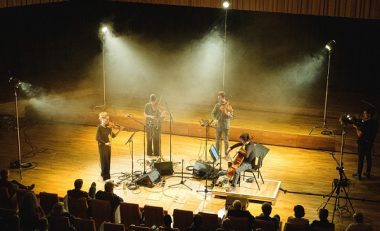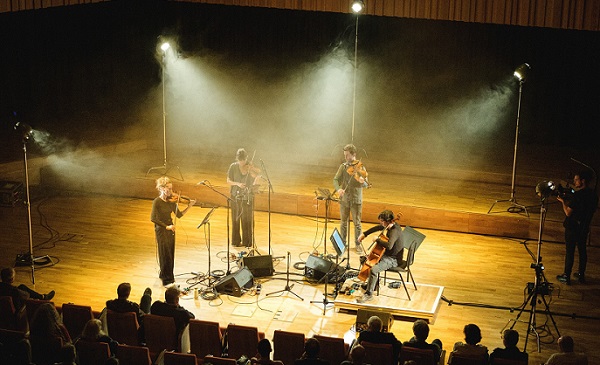 United Kingdom Various, Manchester Collective’s Different Trains: Manchester Collective string quartet (Sara Wolstenholme [violin], Anna Tulchinskaya [violin], Alex Mitchell [viola], Christian Elliott [cello]). Queen Elizabeth Hall, London, 22.9.2023. (JC)
United Kingdom Various, Manchester Collective’s Different Trains: Manchester Collective string quartet (Sara Wolstenholme [violin], Anna Tulchinskaya [violin], Alex Mitchell [viola], Christian Elliott [cello]). Queen Elizabeth Hall, London, 22.9.2023. (JC)

Cassandra Miller – Warblework
Samuel Barber- String Quartet, Op.11, ‘Adagio’
Jasmin Kent Rodgman – four-person simulation
Steve Reich – Different Trains.
The Manchester Collective once again demonstrated why they are masters at introducing contemporary classical music to a wide range of audience when they opened the season at the Southbank Centre’s Queen Elizabeth Hall.
The mildly smoky stage and hazy lighting paved the way for the players, but before the show began Artistic Director Adam Szabo stepped up to give a brief introduction on the pieces of the first half. To the amateur audience of contemporary music, these introductions can be very valuable towards opening the mind to new ways of thinking about music, and the humourous delivery of Adam’s speech helped us settle into our seats for Cassandra Miller’s Warblework.
Written for string quartet Warblework is a composition that began its life as Miller’s fundraising project for her studies in Europe. It consists of the songs of four different types of thrush, whose sound is imitated by the string instruments. Miller, while taking inspiration from birdsong, doesn’t simply translate them onto the page; interweaving between imitations of itself, each birdsong creates its own tonal atmosphere and, complete with its distinctive rhythm, makes four distinctively characteristic songs. The question of whether Miller’s transcription of the birdsongs is faithful to real life remains, however, up for debate.
Programming Samuel Barber’s Adagio for Strings from his String Quartet right after Miller’s Warblework highlighted a new aspect of this well-loved and sometimes overly familiar piece; right after the disparate passing-around of themes and motifs we witness the string quartet and the string sound as an ever-morphing homogeneous form in an almost excessively Romantic idiom. The two pieces paired together showed the great potential of the string quartet and the Manchester Collective convincingly excelled in presenting these two greatly contrasting works.
If Warblework and Barber’s Adagio are to be seen as a pair of diametrically opposed works, then the two next works on the programme, separated by an interval, can be considered two sides of the same coin. Commissioned by the Manchester Collective and performed for the first time that evening, Jasmin Kent Rodgman’s four-person simulation for string quartet, tape and electronics is a profound exploration of the impact of AI on the world and the significance of the human in this new world. Words take on an important role in this music as the piece opens with the voice of an AI woman narrating her first memory. This speech then breaks into fragments as the quartet joins in, with the players singing as well as playing; eventually their voices are distorted by autotune effects. This cycle would repeat for each section until the last one, in which all traces of electronics are removed and what is left is the string quartet playing a repeating sequence of chords. Rodgman’s work uses a lot of techniques found in Steve Reich’s ‘Different Trains’, the last item on the agenda, such as speech and field recordings, as well as an underlying ostinato. The motifs are simple and memorable, the music tonal, but the addition of autotuning creates a jarring effect, showing the thin line between the sublime and the disturbing, and asking the question of what makes it one and not the other. Through this piece, Rodgman asks an increasingly relevant question, and I believe the answer lies in the final section when, by itself, the simple sound of the string instruments suddenly becomes profoundly moving.
Composed only a little over thirty years ago, Steve Reich’s ‘Different Trains’ has already become a classic. Hearing it live, it is little wonder why. Reich is a complete master in the technique of sampling and imitating vocal lines with music; he knows exactly how to let the fragments of speech dissolve into music, deconstructing its verbal meaning but at the same time enriching its value. While taking inspiration from the sounds of technology such as the train horns and the perpetuum mobile of its mechanisms, Reich also imbues his ‘transcriptions’ with emotional substance. The shift in texture and harmony and the constant change of tempo accompanies the change in the narrative. Despite all the sudden changes in tempo, the Manchester Collective quartet navigated this piece flawlessly. Special mention must be given to the cellist Christian Elliott, whose emotional involvement with the music added an extra flavour to the musical groove of this very rhythmic piece. The change in lighting also contributed to the drama of the piece, enhancing the narrative. The Manchester Collective certainly made it worthwhile experiencing this piece in a live setting.
Jeremy Chan
